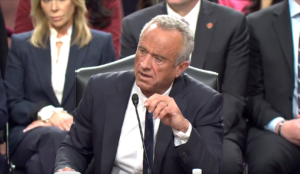- Slug: News-Senate Cabinet Frustration. 750 words.
- Photos available.
By Madeline Bates
Cronkite News
WASHINGTON – Arizona’s Democratic senators, Mark Kelly and Ruben Gallego, have been on the losing end of every confirmation they opposed since President Donald Trump started filling out his Cabinet.
The frustration continued Thursday when Republicans pushed through the confirmation of vaccine skeptic Robert F. Kennedy Jr. as secretary of Health and Human Services. The vote was 52-48, with just one Republican – polio survivor Mitch McConnell, who has already announced he won’t seek reelection – joining Democrats in opposing the nominee.
“Roses are red. Public Health is toast,” Gallego posted on the social media sites X and BlueSky after the pre-Valentine’s Day defeat.
During the floor debate Kelly – a former astronaut and Navy combat pilot – called it dangerous to put someone with RFK’s views over the Centers for Disease Control and Prevention and National Institutes of Health.
“In my career, relying on science literally meant the difference between life and death.The same is true for the person who is responsible for our nation’s health,” Kelly said. “When you’re launching off of an aircraft carrier or orbiting the Earth at 17,500 miles, there’s no room for conspiracy theories. You have to live in reality.”
Roses are red
Public Health is toast— Senator Ruben Gallego (@gallego.senate.gov) February 13, 2025 at 10:32 AM
As of Thursday, the Senate has confirmed 16 nominees. Kelly opposed nine of them. Gallego, six weeks on the job after a decade in the House, opposed seven.
Republicans hold a narrow majority in the Senate with 53 seats. But most have rallied behind Trump’s cabinet picks despite any qualms.
At Kennedy’s confirmation hearing, Sen. Bill Cassidy, R-Louisiana, a physician, recalled a patient who had acute liver failure at age 18 that vaccination could have prevented. He called vaccines a “crucial part of keeping a nation healthy” but ended up supporting the nomination.
Republicans also voiced concerns about other Trump nominees before their confirmations. Defense Secretary Pete Hegseth drew the most GOP pushback, and Vice President JD Vance had to cast the tie-breaking vote to put him over the top.
Gallego, a former combat Marine, called Hegseth “unqualified” – a judgment shared by other Democrats.
The Senate approved another controversial nominee Wednesday over the objection of Arizona’s senators: Tulsi Gabbard as Director of National Intelligence, to oversee the CIA, NSA and other spy agencies.
A number of Republican senators echoed Democratic criticism of Gabbard’s past sympathetic views on Russia and deposed Syrian President Bashar Assad, and on national security leaker Edward Snowden.
But only McConnell bucked Trump. That vote was also 52-48.
Thanks to a rule change pushed through in 2013 by Senate Democrats, a simple majority is all it takes to confirm a nominee – rather than the 60-vote supermajority needed for legislation.
“I think their frustrations are probably less with the rules and more with Republicans,” said Steven Smith, a political science professor at Arizona State University who teaches a class on Congress.
Senators have long been able to use the filibuster to block legislation. During the Civil Rights era, southern Democrats used the tool to delay bills aimed at dismantling segregation.
Overcoming a filibuster requires a supermajority of 60 senators. That’s called cloture.
The 60-vote rule applied to both legislation and nominations until 2013 when Democrats, frustrated that Republicans kept blocking President Barack Obama’s nominees, used their majority to change the rules.
Going forward, nominees for Cabinet and for lower courts would require only a simple majority.
Republicans fumed – including McConnell, the GOP leader at the time.
Midway through Trump’s first term, McConnell, then in charge of a 51-seat GOP majority, pushed through another change to allow Supreme Court confirmations with just 51 votes.
Smith noted that Senate rule changes have a way of coming back to bite the side that pushed them through.
“It’s inevitable that at some point they’ll be in the majority again and the tables will be turned,” Smith said.
Stella Rouse, a professor in ASU’s School of Politics and Global Studies, agreed that the Democratic minority won’t be able to block Cabinet nominations.
“The only thing they can do is delay the process,” she said by email. “I would say Democrats are not coping very well with their current status…. They have been blind-sided by the speed at which Trump (with the capitulation of congressional Republicans) is acting and how he is stepping on constitutional norms, if not violating laws.”
“They are not sure how to react and to date, have not figured out a productive strategy,” she said.
For more stories from Cronkite News, visit cronkitenews.azpbs.org.

